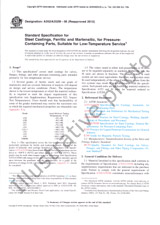We need your consent to use the individual data so that you can see information about your interests, among other things. Click "OK" to give your consent.
The information about the standard:
Designation standards: ASTM F3060-20
Publication date standards: 1.1.2020
SKU: NS-984116
The number of pages: 17
Approximate weight : 51 g (0.11 lbs)
Country: American technical standard
Category: Technical standards ASTM
The category - similar standards:
Aircraft and space vehicle engineering (Vocabularies)Aircraft and space vehicles in general
Annotation of standard text ASTM F3060-20 :
Keywords:
air sport, aircraft, airworthiness, equipment, flight, general aviation, glider, gyroplane, light-sport, lighter than air, power parachute, powerplant, structures, systems, weight shift,, ICS Number Code 01.040.49 (Aircraft and space vehicle engineering (Vocabularies)), 49.020 (Aircraft and space vehicles in general)
Additional information
| 1. Scope | ||||||||||||||||||||||||||||||||||||||||||||||||||||||||||||||||||||||||||||||||||||||||||||||||
|
1.1 This terminology contains a listing of terms, abbreviations, acronyms, and symbols related to aircraft covered by ASTM Committees F37 and F44 airworthiness design standards. It is intended to ensure the consistent use of terminology throughout all ASTM light aircraft standards. 1.2 Units—The definitions of units will be as defined in NIST SP 330 and will not be duplicated in this document. NIST SP 330 is available on the internet. The values stated in either SI units or inch-pound units are to be regarded separately as standard. The values stated in each system may not be exact equivalents; therefore, each system shall be used independently of the other. Combining values from the two systems may result in nonconformance with the standard. 1.3 Source References—The listed document(s) was/were the original source for the definition. However, the definition may have been edited for use in this document and the F37 and F44 standards, and may not completely match the original in every respect. 1.4 A definition adapted from a particular standard within the ASTM aircraft collection of standards is not limited to use within only those standards. 1.5 This standard does not purport to address all of the safety concerns, if any, associated with its use. It is the responsibility of the user of this standard to establish appropriate safety, health, and environmental practices and determine the applicability of regulatory limitations prior to use. 1.6 This international standard was developed in accordance with internationally recognized principles on standardization established in the Decision on Principles for the Development of International Standards, Guides and Recommendations issued by the World Trade Organization Technical Barriers to Trade (TBT) Committee. |
||||||||||||||||||||||||||||||||||||||||||||||||||||||||||||||||||||||||||||||||||||||||||||||||
| 2. Referenced Documents | ||||||||||||||||||||||||||||||||||||||||||||||||||||||||||||||||||||||||||||||||||||||||||||||||
|
We recommend:
Technical standards updating
Do you want to make sure you use only the valid technical standards?
We can offer you a solution which will provide you a monthly overview concerning the updating of standards which you use.
Would you like to know more? Look at this page.




 Cookies
Cookies
